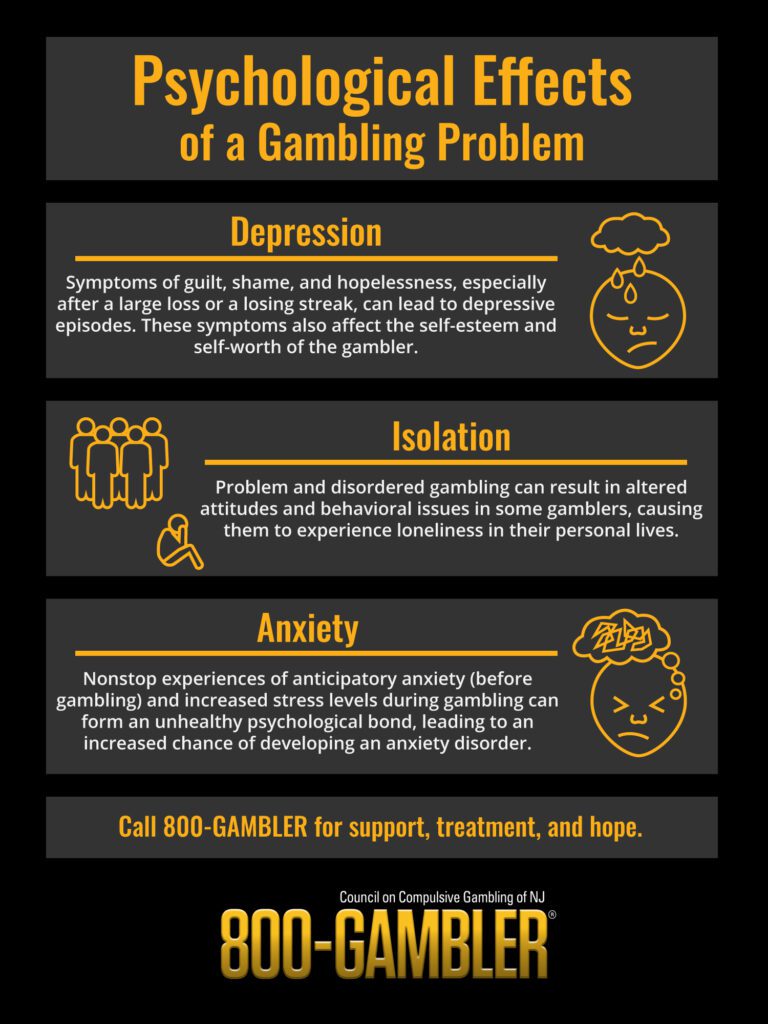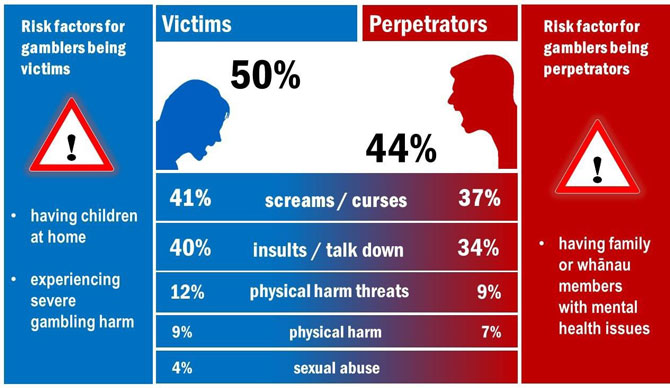Compulsive Gambling Psychology Meaning
The many labels used to describe gambling problems are a source of confusion for the public and frustration for researchers. Commonly used terms include “problem”, “at risk”, “compulsive”, “disordered”, and “pathological” gambling. These various terms reflect the efforts of researchers to describe the different levels of severity observed among people with gambling problems. Labels such as “problem” gambling are used to describe individuals who are experiencing some adverse consequences as a result of their gambling but do not meet the criteria for a diagnosis of pathological gambling.
“Gambling Disorder” is the term used by the American Psychiatric Association in the 5th edition of the Diagnostic and Statistical Manual of Mental Disorders (DSM) to describe the most severe form of the disorder (American Psychiatric Association, 2013). According to the DSM-5, gambling disorder is indicated by four (or more) of the following:
A psychodynamic approach emphasizes the meaning and consequences of one's behavior. After a brief review of the literature, the authors present the first of a two-part model for psychodynamic psychotherapy with pathological gamblers. In this first phase, the immediate goal is abstinence, and five strategies for obtaining it are discussed. These consist of 1.) breaking through the denial 2.
- Preoccupied with gambling
- Unable to cut back or control
- Irritable or restless when attempting to cut down or stop gambling
- Risks more money to reach desired level of excitement
- Gambles to escape problems or depressed mood
- “Chases' losses
- Lies to family and others about gambling
- Risks or loses relationships or job because of gambling
- Relies on others for financial needs caused by gambling
Many people enjoy gambling, whether it's betting on a horse or playing poker on the Internet. Most people who gamble don't have a problem, but some lose control of their gambling. Signs of problem gambling include. Always thinking about gambling; Lying about gambling; Spending work or family time gambling. Compulsive gambling, also called gambling disorder, is the uncontrollable urge to keep gambling despite the toll it takes on your life. Gambling means that you're willing to risk something you value in the hope of getting something of even greater value. Compulsive hoarders often become unable to use rooms in their homes as they were meant to be used and have difficulty moving about the home because of the stored items. Gambling: Compulsive or problem gambling is simply the inability to resist the desire to gamble. Even when and if they win, compulsive gamblers are unable to stop wagering. Like any addiction, what makes compulsive gambling, also called ‘pathological gambling’, an addiction and not just a fun habit, is that compulsive gambling feels impossible to control and you will do it even if it is having negative affects on your life.
Has the game become the main concern of your life? Have you forgotten other aspects such as family, work or social relationships? As you can imagine, none of that is going to bring something positive to your life.
In this article, I will explain to you 7 steps to overcome and get out of gambling, return to your previous life and stop wasting your money. On the other hand, you have to keep in mind that you can do it, although you will have to persevere and be strong.
What is Pathological Gambling (addiction to gambling)?
Gambling addiction or gambling addiction is the psychopathological tendency to play, in which the affected cannot resist the impulse to continue playing.
Normally, this addiction developed in three stages:
- Stage 1: earnings that seem easy are generated
- Stage 2: money is lost and you try to win it with an unrealistic optimism.
- Stage 3: destabilization of the game behavior, frustration.
Often, this addiction occurs along with mental disorders such as anxiety, depression or alcoholism and has now increased due to technology; the boom of smartphones and the internet.
Some doubts about gambling
I would like to clarify some doubts that you usually have with the problem of the game.
-You do not have to play every day to have problems with the game. You have problems with the game if that causes you problems.
-The problem is not only economic. The game can cause a relationship to break or lose important personal relationships.
-The cause of playing is not of others. Some gambling addicts blame their partners for behaving like that. Doing that is avoiding responsibility for your actions, including doing what is necessary to overcome the problem.
-The problem with the game is not overcome by paying the debts, but by overcoming the addictive behavior.
Symptoms of pathological gambling
In gambling addiction, there are no obvious physical signs, as there are in drug or alcohol addiction. In addition, gaming addicts often hide their addiction to others: they travel long distances to play and hide it from their nearby people.
You may have a problem with the game if:
– You play even when you do not have money: bets until you have lost all the money, later you want to recover using money from cards or borrowed money.
-Your family or friends care about you: it’s because the game is affecting your life.
-You want to hide it: bets in secret and lie about what you bet or what you earn.

-You lose control: you are not able to leave the playing area when you lose.
How to get out of gambling?
Accept that you have problems with the game

The biggest step to take in the treatment of pathological gambling is to accept that you have problems with the game.
It takes courage and strength to do so, especially when a large amount of money has been lost or relationships have been lost along the way.
However, it is a necessary step, and many people who have overcome this problem have had to give it.
Overcoming the problem is not easy, although you can if you seek support and continue the treatment.
Make decisions and resist the temptation
Before starting the game, the decision has been made to do so.
If you have the urge to bet, stop doing what you are doing and call someone or think about the consequences of your actions. Do not pay attention to thoughts about the game and do something else immediately.
On the other hand, remember that the odds are against you. The normal thing is that you lose. Do not see the game as an opportunity to get out of your financial problems.
Some ways to control the impulse are:
- Ask the casino to stop you from entering.
- If you are addicted to online games, install a webpage blocker of this type. In extreme case, temporarily get rid of laptop/computer or smartphone, until you get over the problem.
- Postpone the game: Tell yourself that you will play 5, 15 or 60 minutes later, depending on the time you think you can control. As you wait, the urge to play can happen
- Find support: call family, friends or go to groups of people with the same problem
- Do something else: clean, go to the gym, watch a movie …
- Avoid isolation: look for new ways to build personal relationships
- Think about the consequences and how you will feel if you fall into temptation
Control your money
You can not play without money: get rid of credit cards, save and do not borrow money.
Let other people take charge of your money, have the bank make automatic payments and limit the amount of cash you can get.
Plan your time
If not times to play you will not.
Plan healthy leisure activities that have nothing to do with the game.
Avoid places related to the game
Compulsive Gambling Psychology Meaning Examples
Minimize to the maximum the possibility of playing avoiding the places nearby or that remind you of the places where you play.
You can also tell the establishment that you have problems with the game and ask them to restrict your entry.

Also, block your entry to betting websites. In google extensions, you have extensions that do it.
Look for other activities instead of the game
It is worth reflecting on the different ways in which you try to deal with stressful or irritating situations.
Compulsive Gambling Psychology Meaning Definitions
Stress,depression,loneliness or anxiety can trigger the game or make it worse.
To get rid of work or family life there are many other activities that you can have fun with.
Much healthier activities that will have positive consequences on your health are.
- Spend time with friends
- Search for new hobbies
- Exercise
- Relaxation techniques
- Read books
Practice cognitive-behavioral therapy
This therapy focuses on changing thoughts and unhealthy behaviors related to the game, such as rationalizations or limiting beliefs.
It also helps gamblers to:
- Combat the impulses that they have to play
- Treat relational problems arising after addiction
- Deal with financial or labor problems
Visiting a psychologist does not mean that you are weak or that you can not control your problems, but that you are intelligent and responsible enough to realize that you need help.
Keep the recovery
Compulsive Gambling Psychology Meaning Dictionary
When you overcome the addiction, you may relapse again.
For this, it is essential that you establish certain healthy habits that replace the game:
Compulsive Gambling Psychology Meaning Definition
- To relax sports, relaxation techniques, meditation or massages.
- To socialize: learn social skills, find new friends, go to an NGO, sign up for classes in some activity …
- Loneliness or boredom: finding a new passion like sports, music, art, books …

Seek help from associations or organizations in your country
It is very likely that in your country or city there are organizations specialized in helping people who have problems with the game. They have experience and they will know how to advise.

Do not be ashamed to call them, they have hundreds of cases like yours and their will is to help people overcome gambling and rebuild their lives.
Compulsive Gambling Causes
What are your problems with the game? Are you a gambler or do you want to help someone? I’m interested in your opinion to Thank you!